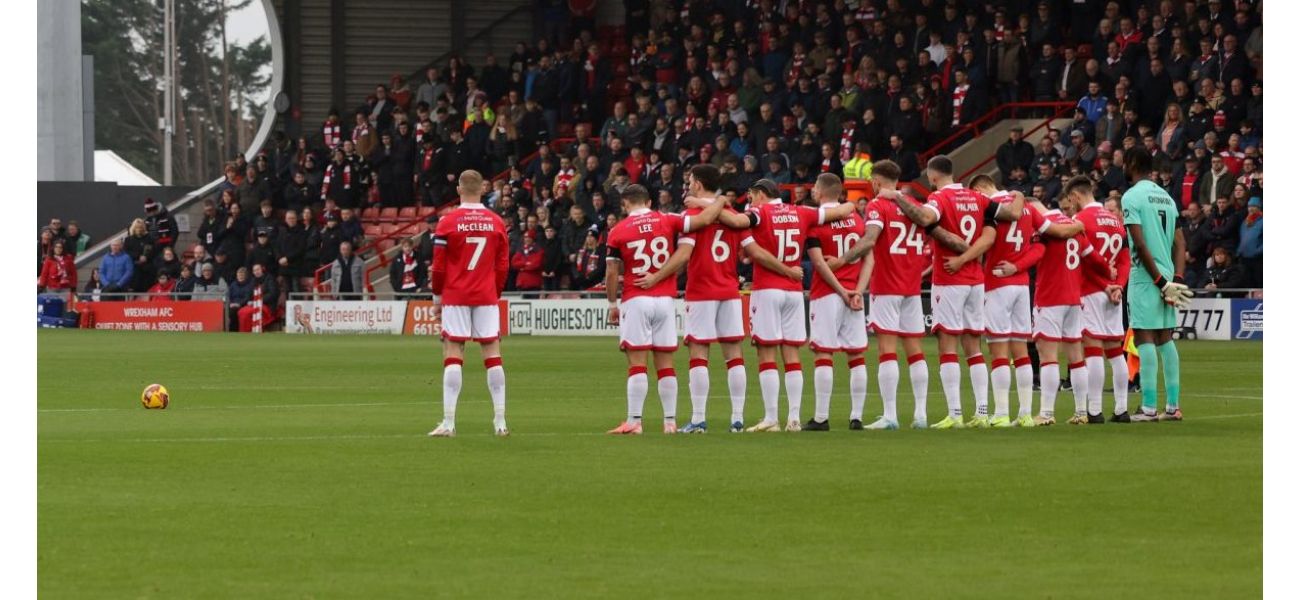Wrexham player James McClean did not join his teammates for a Remembrance silence.
35-year-old from Derry, Northern Ireland declines participation in Remembrance ceremonies after relocating to England.
November 9th 2024.

James McClean, a midfielder for Wrexham, made a bold statement during a recent match ahead of Remembrance Sunday. As his teammates and the opposing team stood united in a moment of silence to honor fallen soldiers, McClean stood apart, choosing not to participate. This is not the first time he has refused to partake in Remembrance commemorations since moving to England in 2011.
In the UK, it is customary for players to observe a moment of silence and wear shirts with Remembrance poppies during professional football matches. However, McClean has made it clear that he does not support this tradition. During Wrexham's League One game against Mansfield Town, the 35-year-old Irishman stood away from his teammates, who were all linked arm in arm, as they paid their respects.
After the moment of silence ended, some Wrexham fans in the stands began to sing a song about McClean "hating the King." This was in reference to a previous incident in which McClean encouraged Wrexham fans to sing an anti-monarchy song during a promotion celebration. He even shared a screenshot of the story on social media, stating that he had no apologies for doing so.
McClean's refusal to wear a poppy on his shirt has been a source of controversy throughout his career. He has played for various teams such as Sunderland, Wigan Athletic, West Brom, and Stoke City, and has faced criticism from some fans for his decision. However, McClean has remained steadfast in his beliefs and has explained his reasoning behind his actions.
Growing up on the Creggan estate in Derry, Northern Ireland, McClean has been deeply affected by the events of The Troubles. This conflict, which lasted from the late 1960s to the late 1990s, saw violence and political unrest in Northern Ireland. One of the most significant events during this time was Bloody Sunday, where British soldiers shot and killed 28 unarmed civilians during a peaceful protest march in January 1972. Six of the victims were from McClean's hometown.
In a 2015 matchday program for West Brom, McClean wrote about his decision not to wear a poppy. He stated that he would have no problem wearing it if it only represented victims of World War One and Two. However, to him, the poppy symbolizes all of Britain's conflicts, including those that have had a personal impact on him and his community. McClean stands by his decision and urges others to understand his perspective before criticizing him.
In the UK, it is customary for players to observe a moment of silence and wear shirts with Remembrance poppies during professional football matches. However, McClean has made it clear that he does not support this tradition. During Wrexham's League One game against Mansfield Town, the 35-year-old Irishman stood away from his teammates, who were all linked arm in arm, as they paid their respects.
After the moment of silence ended, some Wrexham fans in the stands began to sing a song about McClean "hating the King." This was in reference to a previous incident in which McClean encouraged Wrexham fans to sing an anti-monarchy song during a promotion celebration. He even shared a screenshot of the story on social media, stating that he had no apologies for doing so.
McClean's refusal to wear a poppy on his shirt has been a source of controversy throughout his career. He has played for various teams such as Sunderland, Wigan Athletic, West Brom, and Stoke City, and has faced criticism from some fans for his decision. However, McClean has remained steadfast in his beliefs and has explained his reasoning behind his actions.
Growing up on the Creggan estate in Derry, Northern Ireland, McClean has been deeply affected by the events of The Troubles. This conflict, which lasted from the late 1960s to the late 1990s, saw violence and political unrest in Northern Ireland. One of the most significant events during this time was Bloody Sunday, where British soldiers shot and killed 28 unarmed civilians during a peaceful protest march in January 1972. Six of the victims were from McClean's hometown.
In a 2015 matchday program for West Brom, McClean wrote about his decision not to wear a poppy. He stated that he would have no problem wearing it if it only represented victims of World War One and Two. However, to him, the poppy symbolizes all of Britain's conflicts, including those that have had a personal impact on him and his community. McClean stands by his decision and urges others to understand his perspective before criticizing him.
[This article has been trending online recently and has been generated with AI. Your feed is customized.]
[Generative AI is experimental.]
0
0
Submit Comment





